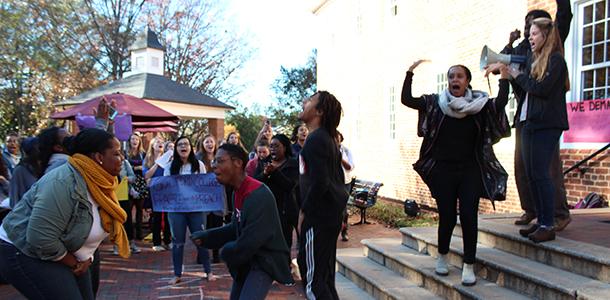Protesters call for integrity, reform
Students chant at the #IntegrityforGuilford rally on Nov. 20, outside of Founders Hall. Following the protests, Board of Trustees members Lionel Johnson and Ester Hall ’74 visited campus on Dec. 3 to respond to student organizers’ list of demands.
“College administrators, professors and staff must publicly acknowledge their racism, be it overt, covert or passive,” reads the sixth on a list of 12 demands for the administration of Guilford College written by a group of student organizers.
On Nov. 12, a group of Guilford College students staged a walkout in support of the University of Missouri and other schools across the country currently addressing issues of race on campus.
An initial version of the list of demands was produced at the walkout.
“If we want Guilford to survive for another hundred years, we have to change now,” said student walkout organizer and senior Noah McDonald.
On Nov. 20, the students led a second rally in front of Founders Hall, where they read a revised version of the list for the administration.
“A coalition of student activists drafted the following list of demands in order to create a new vision of Guilford that will decenter whiteness and become a holistically liberatory space for all community members,” says the list’s introduction.
The rally organizers asked that people use #IntegrityforGuilford on social media posts in association with the fight for racial justice at Guilford and to serve as a title for the movement.
While racism, specifically on Guilford’s campus, has become a more widely discussed topic, it is not a new topic.
A Diversity Action Committee was created in 2009 to address racial inequity and injustice at Guilford.
The DAC, along with departments like the Bonner Center and the Multicultural Education Department, has been working since to address race issues, but those doing the work have pointed out the importance of participation and effort from the entire community.
In response to the recent walkouts, President Jane Fernandes sent out two emails in which she acknowledged the need to address and act upon racism at Guilford amongst the community and within the administration and its practices.
“Last Friday, our campus held two very important conversations about our need to come together as a community to dismantle racism at Guilford College,” said Fernandes in an email to the Guilford community.
“These conversations gave us ideas, examples and problems that we need to discuss further and act upon.”
Attendance by community members from all levels of the college in both forums was low.
“When a pushback against white supremacy is sensationalized in these ways, it highlights how disconnected white students, faculty, staff and administration are from the lived experiences of people of color on campus,” said LGBTQA coordinator Parker Hurley.
“Every day, people of color are having to negotiate racial violence in the form of micro aggressions, under-representation and various forms of institutional racism.”
Some anonymous respondents shared contrary thoughts on Yik Yak.
“So when someone gets their feelings hurt, it’s now a race war?” said one post. “Good job everyone. You’re all a bunch of p—-ies.”
Some posts slandered Muslims and the entire religion of Islam.
“Islam is an evil system that is violent towards women and the LGBT community and was founded by a pedophile,” said another anonymous post.
Comments like these on Yik Yak show different opinions about the racial climate of Guilford along with resistance towards acknowledging and addressing issues of race on campus.
“It says a lot about a group of people when they are uncomfortable talking about racism,” said #IntegrityforGuilford organizer Brandee Craig ’17. “White supremacy kills people, and groups of people at that. Why are we comfortable with that?”
Many testimonies by students of color experiencing racism at Guilford were given at the Nov. 12 walkout and in the forums held by Fernandes.
After these testimonies were shared, the question is how the administration and the community are going to more forward.
“Not all conflicts are negative,” said Gia Henry, Conflict Resolution Resource Center coordinator.
“The fact that it is happening means that the climate of the College is one in which we, collectively, are ready to grow and move forward.”
Community members such as those who work in the Bonner Center and the Multicultural Education Department, along with many student groups, can offer advice on how to proceed.
Hurley expressed cautious optimism for the future.
“I strongly believe that when the intentionality, transparency, emotional labor and desire for accountability and collective liberation modeled by students of color and white students who are in solidarity with students of color are matched by white people of Guilford, we will align ourselves with our core values and truly be an anti-racist and anti-oppression institution.”







